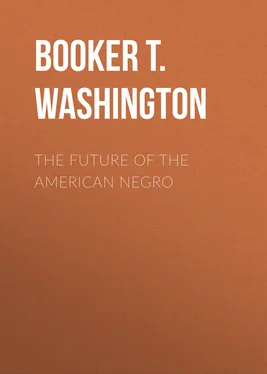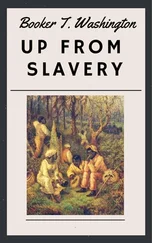Booker T. Washington - The Future of the American Negro
Здесь есть возможность читать онлайн «Booker T. Washington - The Future of the American Negro» — ознакомительный отрывок электронной книги совершенно бесплатно, а после прочтения отрывка купить полную версию. В некоторых случаях можно слушать аудио, скачать через торрент в формате fb2 и присутствует краткое содержание. Жанр: foreign_prose, История, foreign_edu, foreign_antique, на английском языке. Описание произведения, (предисловие) а так же отзывы посетителей доступны на портале библиотеки ЛибКат.
- Название:The Future of the American Negro
- Автор:
- Жанр:
- Год:неизвестен
- ISBN:нет данных
- Рейтинг книги:3 / 5. Голосов: 1
-
Избранное:Добавить в избранное
- Отзывы:
-
Ваша оценка:
- 60
- 1
- 2
- 3
- 4
- 5
The Future of the American Negro: краткое содержание, описание и аннотация
Предлагаем к чтению аннотацию, описание, краткое содержание или предисловие (зависит от того, что написал сам автор книги «The Future of the American Negro»). Если вы не нашли необходимую информацию о книге — напишите в комментариях, мы постараемся отыскать её.
The Future of the American Negro — читать онлайн ознакомительный отрывок
Ниже представлен текст книги, разбитый по страницам. Система сохранения места последней прочитанной страницы, позволяет с удобством читать онлайн бесплатно книгу «The Future of the American Negro», без необходимости каждый раз заново искать на чём Вы остановились. Поставьте закладку, и сможете в любой момент перейти на страницу, на которой закончили чтение.
Интервал:
Закладка:
Some time ago, when we decided to make tailoring a part of our training at the Tuskegee Institute, I was amazed to find that it was almost impossible to find in the whole country an educated coloured man who could teach the making of clothing. We could find them by the score who could teach astronomy, theology, grammar, or Latin, but almost none who could instruct in the making of clothing, something that has to be used by every one of us every day in the year. How often has my heart been made to sink as I have gone through the South and into the homes of people, and found women who could converse intelligently on Grecian history, who had studied geometry, could analyse the most complex sentences, and yet could not analyse the poorly cooked and still more poorly served corn bread and fat meat that they and their families were eating three times a day! It is little trouble to find girls who can locate Pekin or the Desert of Sahara on an artificial globe, but seldom can you find one who can locate on an actual dinner table the proper place for the carving knife and fork or the meat and vegetables.
A short time ago, in one of the Southern cities, a coloured man died who had received training as a skilled mechanic during the days of slavery. Later by his skill and industry he built up a great business as a house contractor and builder. In this same city there are 35,000 coloured people, among them young men who have been well educated in the languages and in literature; but not a single one could be found who had been so trained in mechanical and architectural drawing that he could carry on the business which this ex-slave had built up, and so it was soon scattered to the wind. Aside from the work done in the institutions that I have mentioned, you can find almost no coloured men who have been trained in the principles of architecture, notwithstanding the fact that a vast majority of our race are without homes. Here, then, are the three prime conditions for growth, for civilisation,—food, clothing, shelter; and yet we have been the slaves of forms and customs to such an extent that we have failed in a large measure to look matters squarely in the face and meet actual needs.
It may well be asked by one who has not carefully considered the matter: "What has become of all those skilled farm-hands that used to be on the old plantations? Where are those wonderful cooks we hear about, where those exquisitely trained house servants, those cabinet makers, and the jacks-of-all-trades that were the pride of the South?" This is easily answered,—they are mostly dead. The survivors are too old to work. "But did they not train their children?" is the natural question. Alas! the answer is "no." Their skill was so commonplace to them, and to their former masters, that neither thought of it as being a hard-earned or desirable accomplishment: it was natural, like breathing. Their children would have it as a matter of course. What their children needed was education. So they went out into the world, the ambitious ones, and got education, and forgot the necessity of the ordinary training to live.
God for two hundred and fifty years, in my opinion, prepared the way for the redemption of the Negro through industrial development. First, he made the Southern white man do business with the Negro for two hundred and fifty years in a way that no one else has done business with him. If a Southern white man wanted a house or a bridge built, he consulted a Negro mechanic about the plan and about the actual building of the house or bridge. If he wanted a suit of clothes or a pair of shoes made, it was to the Negro tailor or shoemaker that he talked. Secondly, every large slave plantation in the South was, in a limited sense, an industrial school. On these plantations there were scores of young coloured men and women who were constantly being trained, not alone as common farmers, but as carpenters, blacksmiths, wheelwrights, plasterers, brick masons, engineers, bridge-builders, cooks, dressmakers, housekeepers, etc. I would be the last to apologise for the curse of slavery; but I am simply stating facts. This training was crude and was given for selfish purposes, and did not answer the highest ends, because there was the absence of brain training in connection with that of the hand. Nevertheless, this business contact with the Southern white man, and the industrial training received on these plantations, put the Negro at the close of the war into possession of all the common and skilled labour in the South. For nearly twenty years after the war, except in one or two cases, the value of the industrial training given by the Negroes' former masters on the plantations and elsewhere was overlooked. Negro men and women were educated in literature, mathematics, and the sciences, with no thought of what had taken place on these plantations for two and a half centuries. After twenty years, those who were trained as mechanics, etc., during slavery began to disappear by death; and gradually we awoke to the fact that we had no one to take their places. We had scores of young men learned in Greek, but few in carpentry or mechanical or architectural drawing. We had trained many in Latin, but almost none as engineers, bridge-builders, and machinists. Numbers were taken from the farm and educated, but were educated in everything else except agriculture. Hence they had no sympathy with farm life, and did not return to it.
This last that I have been saying is practically a repetition of what I have said in the preceding paragraph; but, to emphasise it,—and this point is one of the most important I wish to impress on the reader,—it is well to repeat, to say the same thing twice. Oh, if only more who had the shaping of the education of the Negro could have, thirty years ago, realised, and made others realise, where the forgetting of the years of manual training and the sudden acquiring of education were going to lead the Negro race, what a saving it would have been! How much less my race would have had to answer for, as well as the white!
But it is too late to cry over what might have been. It is time to make up, as soon as possible, for this mistake,—time for both races to acknowledge it, and go forth on the course that, it seems to me, all must now see to be the right one,—industrial education.
As an example of what a well-trained and educated Negro may now do, and how ready to acknowledge him a Southern white man may be, let me return once more to the plantation I spoke of in the first part of this chapter. As the years went by, the night seemed to grow darker, so that all seemed hopeless and lost. At this point relief and strength came from an unexpected source. This Southern white man's idea of Negro education had been that it merely meant a parrot-like absorption of Anglo-Saxon civilisation, with a special tendency to imitate the weaker elements of the white man's character; that it meant merely the high hat, kid gloves, a showy walking cane, patent leather shoes, and all the rest of it. To this ex-master it seemed impossible that the education of the Negro could produce any other results. And so, last of all, did he expect help or encouragement from an educated black man; but it was just from this source that help came. Soon after the process of decay began in this white man's estate, the education of a certain black man began, and began on a logical, sensible basis. It was an education that would fit him to see and appreciate the physical and moral conditions that existed in his own family and neighbourhood, and, in the present generation, would fit him to apply himself to their relief. By chance this educated Negro strayed into the employ of this white man. His employer soon learned that this Negro not only had a knowledge of science, mathematics, and literature in his head, but in his hands as well. This black man applied his knowledge of agricultural chemistry to the redemption of the soil; and soon the washes and gulleys began to disappear, and the waste places began to bloom. New and improved machinery in a few months began to rob labour of its toil and drudgery. The animals were given systematic and kindly attention. Fences were repaired and rebuilt. Whitewash and paint were made to do duty. Everywhere order slowly began to replace confusion; hope, despair; and profits, losses. As he observed, day by day, new life and strength being imparted to every department of his property, this white son of the South began revising his own creed regarding the wisdom of educating Negroes.
Читать дальшеИнтервал:
Закладка:
Похожие книги на «The Future of the American Negro»
Представляем Вашему вниманию похожие книги на «The Future of the American Negro» списком для выбора. Мы отобрали схожую по названию и смыслу литературу в надежде предоставить читателям больше вариантов отыскать новые, интересные, ещё непрочитанные произведения.
Обсуждение, отзывы о книге «The Future of the American Negro» и просто собственные мнения читателей. Оставьте ваши комментарии, напишите, что Вы думаете о произведении, его смысле или главных героях. Укажите что конкретно понравилось, а что нет, и почему Вы так считаете.










